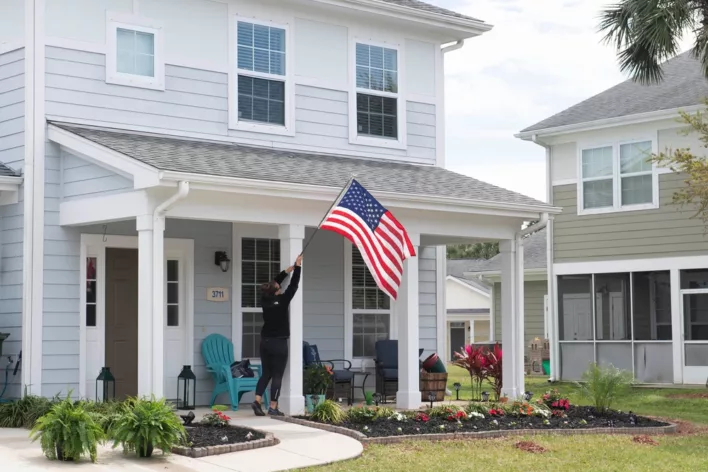More Capitol Hill Scrutiny On Military Housing Problems

Military housing problems have been a continuous source of headlines–and DoD headaches in 2023.
In addition to continuous grilling by public officials over lead paint in military family housing, overflowing sewage, and black mold in barracks, dorms, and (again) military family housing units, there’s new scrutiny over the accessibility of base housing.
Air Force Times reports that the Chair of the Senate Armed Services Committee is demanding answers and “additional actions by DoD, as well as oversight from Congress, in order to address concerns” about the DoD’s Exceptional Family Member Program (EFMP) including issues of accessible homes for disabled residents and the lack thereof in military family housing.
Should military families have to endure long waiting lists for Americans With Disabilities Act (ADA) compliant base housing? Should they have to pay out of pocket to modify non-ADA-compliant housing? Those are among the most recent big questions asked of the DoD.
What Is EFMP?
The Exceptional Family Member Program is described by DoD literature as follows:
“When you have a family member with special needs, you may have special considerations that require additional steps or resources to care for your family. Exceptional Family Member Program Family Support is here to help…”
According to the DoD, the Office of Special Needs was created “to help families with special needs thrive in military life…The Exceptional Family Member Program does this through Identification and Enrollment, Assignment Coordination and Family Support.”
But that support isn’t enough, according to some complaints and even lawsuits directed at the federal government over EFMP issues and a lack of accessible base housing for family members with physical, developmental, or intellectual disabilities. There are more than 100 thousand military families enrolled in EFMP.
Enrolling in EFMP is meant to help these families, but when basic ADA compliance isn’t a part of that program, what other help is offered simply isn’t quite enough.
Why Do Some Families Have To Pay To Make Military Housing Units ADA-Compliant?
If a military base has no ADA-compliant housing, families are often forced to modify their homes to make them as accessible as possible.
Senators have pressed DoD officials over why some military families, according to Air Force Times, “have had to pay out of pocket for changes to their on-base housing — such as drop-down rails or ramps — in the past 10 years, and how many families have had to pay to undo the changes when they moved out of their homes.”
Senator Elizabeth Warren and Senator Thom Tillis asked these questions of Secretary of Defense Lloyd Austin. Warren chairs the Senate Armed Services personnel subcommittee.
There were DoD attempts in 2023 to create more standardized policies for EFMP but the housing issue (accessibility and habitability) is still a major problem for many families. And it’s not just that there are long wait times for military family housing accessible for a handicapped resident.
There’s also that matter (see above) of being forced to adopt non-ADA-compliant homes at the family’s expense. Never mind that the family was assigned to the base by the DoD and didn’t volunteer to move to a non-ADA-compliant situation.
Related: Military Allowances Guide
Unanswered Questions
The questions asked at the start of this article are still unaddressed at press time. Why are these families required to pay out of pocket for ADA-compliant military housing? Should military families have to pay for their own wheelchair ramps, railings, and other accessibility features?
And why do families enrolled in EFMP complain about the excessive paperwork, which, according to Air Force Times, requires a high level of personal information “about their health status to get assigned to an ADA-compliant home”?
According to Senators Warren and Tillis, the Department of Defense’s current response isn’t enough. Without centralized, standardized EFMP processes that include Americans With Disabilities Act (ADA) compliant housing, these families are underserved despite the sacrifices they are asked to make for their country.
One of the most troublesome and revealing stats related to this issue? Air Force Times’ observation that “There are installations where the average amount of time a family spends on a waitlist isn’t tracked at all” with any available information raising eyebrows among D.C. lawmakers.
In an era where the Army, Air Force, and other branches of service are struggling to attract new recruits, these military housing headlines may play a bigger role in that issue than the DoD currently acknowledges.
When Senators Tillis and Warren wrote to SecDef Lloyd Austin, they noted, “The incremental improvements and continued oversight challenges make the lives of service members and their families difficult and raise questions about morale and readiness which also impact retention…” (emphasis ours.)
Related: Active Duty Military Benefits Guide
About the author
Editor-in-Chief Joe Wallace is a 13-year veteran of the United States Air Force and a former reporter/editor for Air Force Television News and the Pentagon Channel. His freelance work includes contract work for Motorola, VALoans.com, and Credit Karma. He is co-founder of Dim Art House in Springfield, Illinois, and spends his non-writing time as an abstract painter, independent publisher, and occasional filmmaker.


